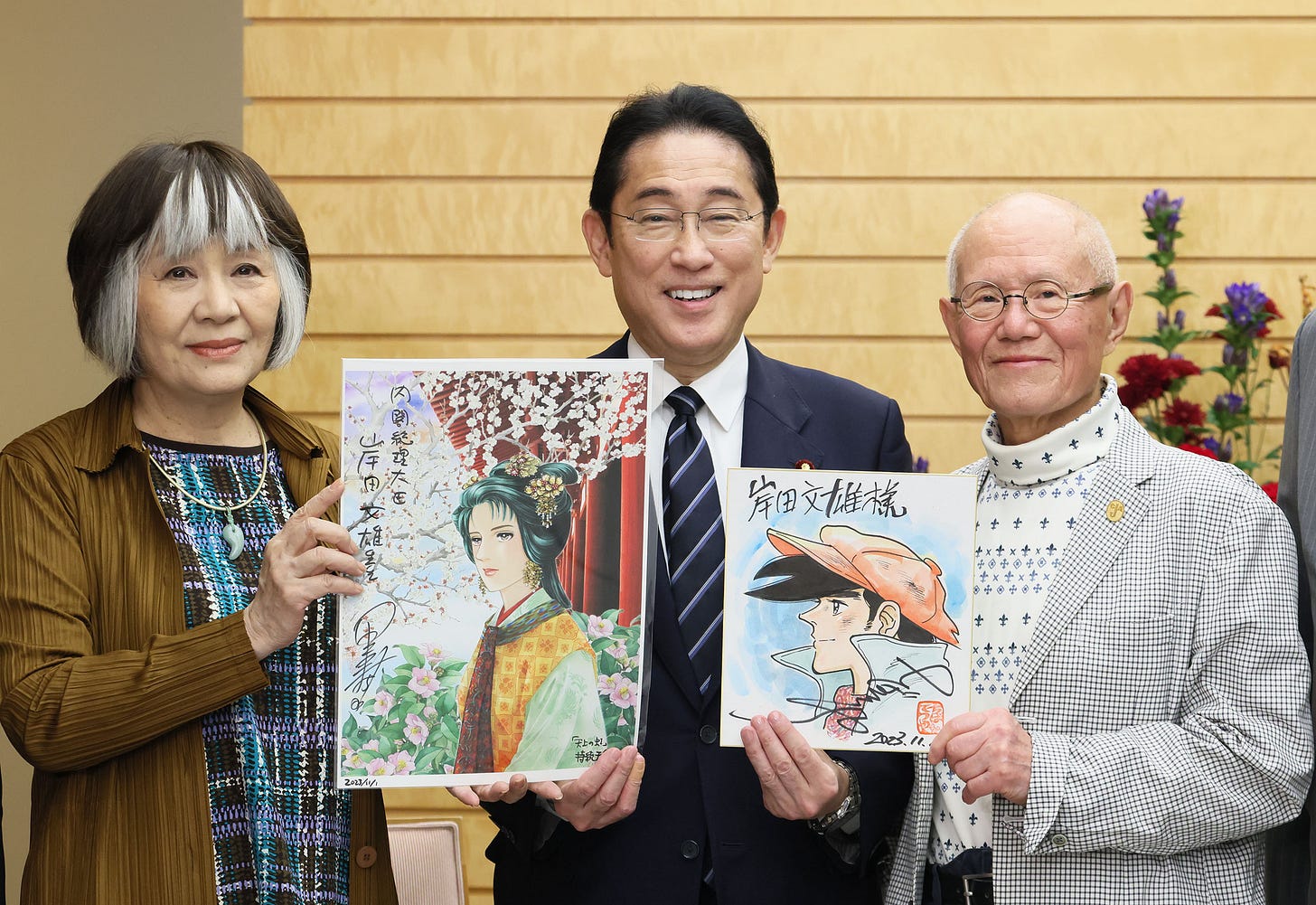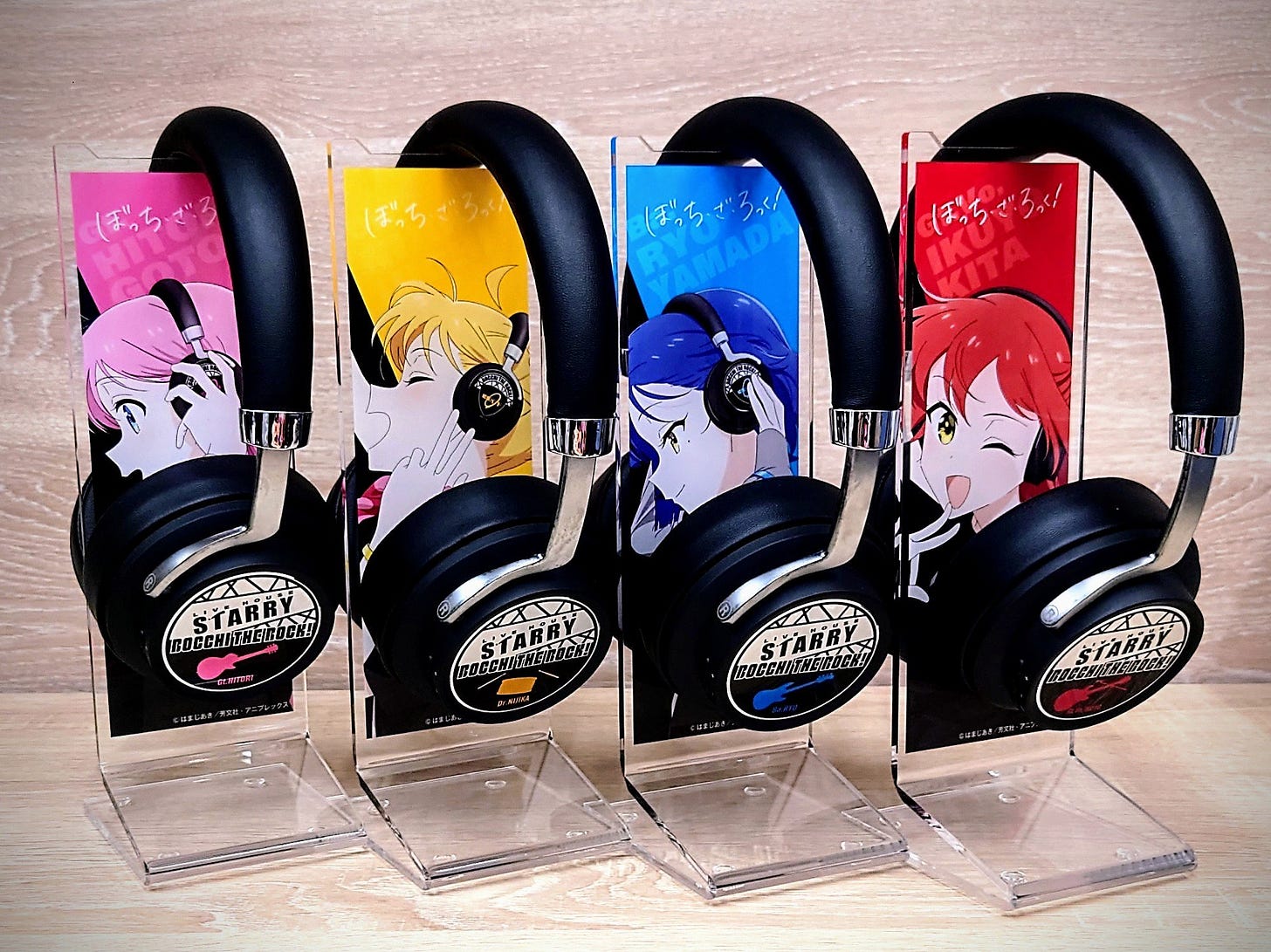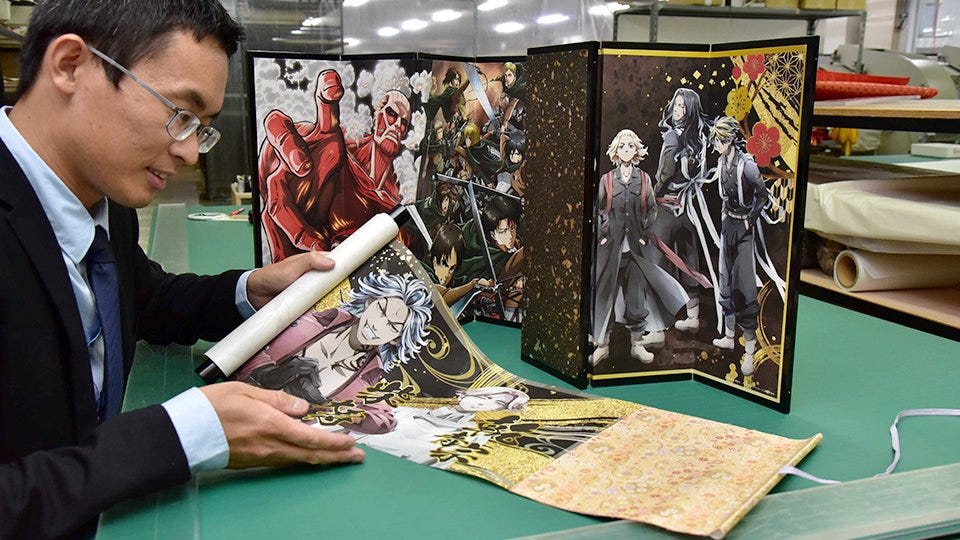Kishida exit risks Japan's pro-anime policies
Plus: Audio brand Onkyo remakes itself as anime lifestyle brand; Anime music surges on Spotify; Anime musical production studio steps abroad; and more
This is your weekly Animenomics briefing, covering the business of anime and manga. Today is Wednesday, August 21, 2024.
In case you missed it: Voice actor Atsuko Tanaka, who played the role of Ghost in the Shell protagonist Motoko Kusanagi, has died at the age of 61.
Kishida exit risks Japan’s anime policymaking progress

Prime minister Fumio Kishida’s decision to not seek reelection as party leader guarantees Japan a new leader next month, and his abrupt exit could put current government efforts to promote anime and manga in jeopardy.
Why it matters: In the last three years, Kishida has sought to expand the role that anime and other Japanese media play in the global market while addressing labor challenges facing the industry.
What we’re watching: “There is a possibility that the administration will change and we will have to restart [the policy discussions] all over again,” entertainment journalist Hotaka Sugimoto writes in a blog post.
“Live-action and anime are currently in a phase that requires reasonable government support,” he adds.
What’s at stake: Kishida’s government announced in June that its wants to quadruple the overseas market for anime, manga, video games, and other creative industries, to ¥20 trillion (US$133 billion) over the next decade.
The prime minister also instructed Japan’s Fair Trade Commission earlier this year to investigate contracts in the anime industry that grant producers unfair bargaining powers against anime studios.
Additionally, Kishida’s cabinet approved plans to establish a national museum to preserve and exhibit original manga art and animation cels after years of stalled proposals.
“Anime, movies, music, video games, manga, broadcast programs, and other contents are assets that Japan should take pride in,” he said in April while announcing a public–private partnership to revitalize the content industry.
One big thing: A law enacted last year by the government to protect freelance workers, many of whom work in the entertainment sectors, will go into effect in November.
More than half of workers in the anime industry don’t have permanent work contracts, according to a survey by the Japan Animation Creators Association.
The new law aims to reduce ambiguities in freelancers’ employment contracts and improve their working conditions.
Yes, but: For many anime industry workers, Kishida remains unpopular for his decision last year to move forward with eliminating a consumption tax exemption for small businesses.
Home audio brand Onkyo evolves with anime collabs

Osaka-based Onkyo Corporation was a renowned manufacturer of home audio equipment until it entered bankruptcy in 2022, but after its businesses were split up Onkyo has remade itself as a lifestyle brand collaborating with anime IPs.
Why it matters: Anime-branded consumer electronics have grown in popularity in recent years as anime merchandising moves into the high-end products.
At last month’s Anime Expo convention in Los Angeles, Animenomics saw anime-branded audio equipment that retail for as much as US$1,000.
Catch up quick: The current Onkyo Corporation is made up of the R&D and marketing divisions of the former Onkyo group.
Its parent Onkyo Home Entertainment sold the ONKYO home audio brand to Sharp and Voxx International in 2021 and became bankrupt the following year.
Onkyo Corporation today primarily develops and produces consumer audio equipment with anime rightsholders.
What’s happening: Since Onkyo first entered the anime business in 2015, it has collaborated with more than 300 anime titles on co-branded audio products.
Onkyo licenses audio technology to anime production companies so that they can create the branded audio merchandise.
These products are labeled “Powered by ONKYO” or “Sound by ONKYO” because Onkyo Corporation can no longer use the standalone ONKYO brand.
Where things stand: Onkyo now operates an online retail store and two physical stores in Tokyo’s Akihabara district.
More than 50,000 customers visited the two stores in Akihabara last year, and the online store now has more than 300,000 registered users.
Clippings: Spotify anime music streams surge globally

Anime music streams on Spotify have grown nearly 400 percent since 2021, the company revealed in a rebranding of its platform’s anime music hub. Spotify is now collaborating with Crunchyroll on several curated playlists. (Press release)
Zoom in: Nostalook, an animation group specializing in retro anime styles, created the cover art for Spotify’s anime playlists. The group previously made the art for King Records’s 24-hour anime music YouTube channel.
Kadokawa’s cyberattack recovery cost the company ¥3.6 billion (US$24 million). The publishing conglomerate will maintain its year-end revenue forecast despite lower publishing revenues thanks to strong anime and video game sales. (Earnings results)
Universal Studios Japan surpassed Tokyo Disneyland last year as the third most popular theme park worldwide, seeing a nearly 30 percent jump in visitors thanks to the popularity of attractions related to anime and video games. (The Nikkei)
AI manga localizer Orange, which announced ¥2.92 billion (US$18.8 million) in pre-Series A financing earlier this year, is reportedly considering expanding into Spanish-speaking countries and India. (Nikkei Asia)
Gundam robot plastic model kits made using a small amount of raw material from recycled plastic bottles are being used by Bandai Spirits to teach elementary schoolchildren about plastic recycling. (TBS News Dig)
Anime musical adaptations find their future overseas
“As Japan’s population is declining, we, as a company that deals with stage productions, consider the decline in audience numbers to be a major issue. However, I believe that entertainment, including stage performances, is not a passing fad, but something universal that continues to enrich people’s hearts and give them the energy to live.”
— Sachiko Nogami, Nelke Planning president
Context: Nogami, in an interview with Nelke Planning parent CyberAgent, sees overseas markets as the future of Japan’s musical theater adaptations of anime, manga, and video games. The company is a a stage play production studio that adapts anime and manga.
Nelke Planning will bring Attack on Titan: The Musical, an adaptation of the popular manga, to the United States in October, with four shows scheduled at the 2,200-seat New York City Center.
Zoom out: As previously reported by Animenomics, these 2.5D musicals, as they are called, earned ¥26.2 billion (US$175 million) and accounted for over 40 percent of total musical theater revenues domestically in 2022.
Nogami says the company now controls almost 60 percent of the domestic 2.5D musical market.
Japanese scroll artisans venture into anime illustrations

Hanging scrolls featuring watercolor art and calligraphy decorate traditional-style rooms throughout Japan, but a Gifu Prefecture-based maker of such scrolls is now putting anime characters on them to help preserve the art form.
Why it matters: With Japan building more modern buildings, the artisans making traditional hanging scrolls, the kakejiku, face difficulty finding successors to take over their trade, the Gifu Shimbun newspaper reports.
Driving the story: Kaitakudo Art, which has produced and sold hanging scrolls for more than 50 years, is partnering with a Tokyo-based manufacturer of anime merchandise to make high-quality products for the anime market.
While folding screens and hanging scrolls typically use Japanese washi paper, the anime illustrations are printed on polyester cloth to prevent ink bleeding.
What they’re worth: Anime fans see Kaitakudo Art’s anime scrolls and folding screens as luxury products, with folding screens being priced at around ¥50,000 (US$330) and hanging scrolls priced at around ¥30,000 (US$200).
Zoom in: Anime producers are responding to this new type of merchandise, and Kaitakudo Art has collaborated to create scrolls for titles like Attack on Titan, One Piece, and Mazinger Z.
At the AnimeJapan trade exhibition in March, broadcaster TV Tokyo sold Kaitakudo Art’s hanging scrolls featuring characters from Naruto.
Animenomics is an independently-run and reader-supported publication. If you enjoyed this newsletter, consider sharing it with others.



I found your analysis of the potential impact of Kishida's exit on Japan's anime policies to be quite insightful and timely. I also appreciated your deep dive into Onkyo’s transformation and the increasing global influence of anime music.
Thank you for this. I enjoy anime and loved reading this.